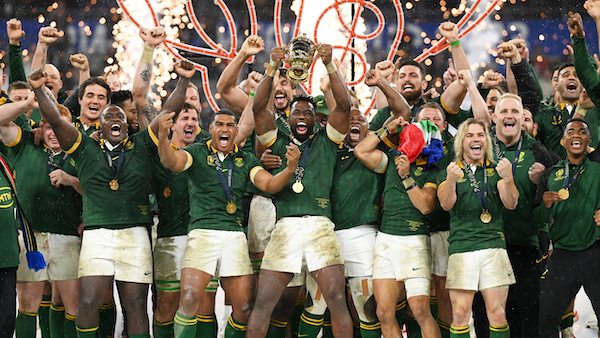Steven Mervis Head Strategist at Mscsports, says when the Springboks lifted the Rugby World Cup trophy in 2019, they weren’t just securing a championship title — they were rewriting their brand narrative.
At that time, their sponsor roster included only a few brands such as MTN, Asics, FNB, Tsogo Sun, Energade, Land Rover, Southern Palace, Castle Lager, and a handful of suppliers. The 2019 victory proved to be a turning point, attracting new sponsors eager to align with a world-class, winning team.
The Springboks’ remarkable transformation from a brand struggling to secure sponsorships to one boasting around 30 partners in 2023 offers valuable lessons for smaller sporting codes like hockey and netball. After ABSA ended its sponsorship deal in 2015, the Springboks faced a challenging period. However, their resurgence as a highly marketable brand demonstrates how on-field success, effective relationship management, and strategic sponsorship categories can unlock significant opportunities.
The Power Of Winning On The Field
For any sports federation, winning is the ultimate currency. Victory increases visibility, drives positive sentiment and associates brands with success. The lesson for smaller sports is clear: prioritise performance and aim for excellence on the field. Success on the field is a powerful driver of sponsorship success, making it easier to sell a property that’s already winning trophies.
While winning attracts sponsors, maintaining strong relationships ensures their continued support. The Springboks have excelled in this area by establishing a dedicated team of account managers focused on nurturing these relationships. These account managers serve as liaisons between sponsors and the team, ensuring that brands’ investments are maximised, expectations are met, and needs are addressed promptly.
For smaller sports federations, a personalised approach to managing sponsorship accounts can be transformative. Organisations can build trust and loyalty by investing in a team dedicated to sponsor relations, leading to longer-term partnerships. The Springboks model shows that giving sponsors the attention they deserve is key to sustaining and growing these relationships.
Another effective strategy employed by the Springboks is offering brands the opportunity to own specific categories within their sponsorship agreements. This approach reduces overlap and competition among sponsors while allowing each brand to maximise its impact within its designated category. For example, the Springboks have partners in sectors like vehicles, fuel, betting, and energy drinks.
Smaller sports federations can adopt this model by clearly defining and diversifying their sponsorship categories. Offering exclusive sponsorship rights within specific categories creates a sense of exclusivity and enhances the perceived value of the partnership, making it more attractive to a wider variety of brands.
The Springboks’ journey from a brand struggling to attract sponsors to one with a robust sponsorship portfolio is a masterclass in blending on-field success with strategic off-field management. Their World Cup victory in 2019 ignited their sponsorship growth, but it was the careful management of sponsor relationships and the strategic categorisation of sponsorship opportunities that sustained it.
For smaller sporting codes to replicate the Springboks’ success, they must first focus on achieving excellence on the field. Victory creates the initial attraction for brands, but it’s the thoughtful management of sponsor relationships and the strategic allocation of sponsorship categories that will build long-term, mutually beneficial partnerships.
MSCSPORTS
www.mscsports.co.za










